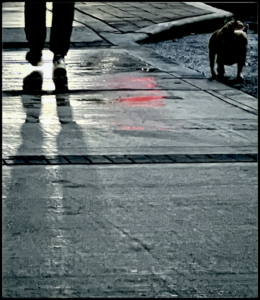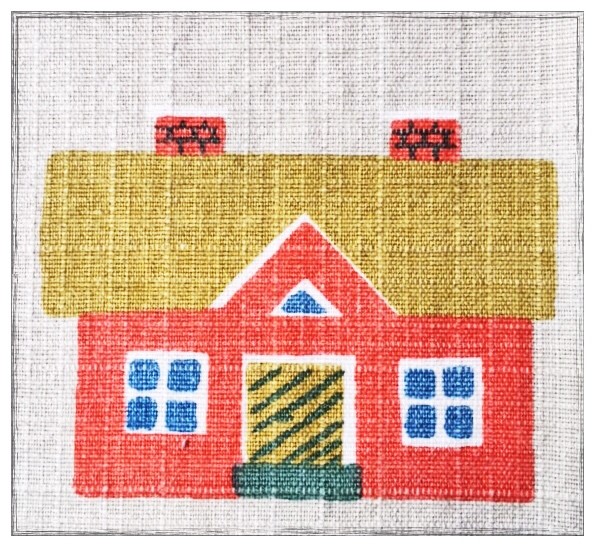
by Lisa Marguerite Mora
It was red and perfect. Singular. Sitting pristine on the bush, the rose was fully bloomed. I’d been watching it, the small plot of garden for weeks. Boredom was the dusty dry heat of the sidewalk every day after school. Endless concrete pavement, I’d count the cracks, sometimes tried not to step on them. To entertain myself, instead of traveling straight down the boulevard home, I zig-zagged up and down the avenues so I could look at all the charming houses. All my life I’ve been looking for the relief of beauty. Though I wouldn’t have called it that back in the 2nd grade. Maybe I called it fun or wow! or thought of it as some kind of entertainment. Though, the rose, when I saw it, didn’t fall into either category. It beckoned from another world. Dark crimson velvet edged in light. That day I stopped when I saw it. In my mind formed the word, “More.”
Sophie was also in the second grade, but she was eight while I was seven. A big boned Scandinavian, I remember her hair falling prettily out of her long brown and golden pony tail. Her parents were young. And very free. Actually I don’t know if the long haired man who seemed to often be at their apartment with Sophie and her mother, if he was her father. I decided he was father-like, completing for them a family unit. She lived across the alley from me in a more modern apartment than mine. Hers smelled bright and sweet, with wall to wall beige carpet and Sophie had her own room. And Barbie dolls. I had a Francie. Recently I’d acquired a little red polka dotted raincoat and red rubber boots for her. I brought them across the alley to Sophie’s home, . Sophie’s bed was up on concrete blocks. Many of my friend’s homes were make-do like this. I didn’t think anything of it as our furniture was haphazard as well. Most people, I thought lived this way unless they were “rich” and part of another world.
The red rose, I’ve recently learned, is the emblem for the House of Lancaster a royal lineage to the throne of England in the late 1400s. The white rose was the House of York and the two houses fought each other in the War of the Roses or the Cousins War (they were all related) for the right to rule. Being close to the crown afforded a person luxury and protection and riches. The discrepancy between the classes then was especially marked as it is becoming today. Wealth and power has always been very seductive if only for the physical comforts they afford. Eventually the bloodshed between the two houses, culminated in the disappearance and probable murder of two boy princes, royal heirs of the House of York supposedly by the hand of their uncle Richard the Third, who was not even of the red rose faction. But we don’t know for sure that he killed them, his own nephews. Some say the deed was ordered by Margaret Beaufort of the House of Lancaster, the red rose. Richard was eventually killed in a final battle and Henry Tudor the Lancastrian heir, son of Margaret Beaufort, took the throne. He married a York princess and thus the Tudor Rose was born, the unification of the white and the red roses. With his reign came years of peace. I didn’t know any of this when I was seven. I knew only that I loved roses, which were as rare and as precious as diamonds to me, especially the ones that seemed to be made of red velvet.
They represented also the month I was born and I thought myself lucky. Maybe even special. The red rose in the garden perched and floating on one stem of a single green bush, contrasted against the seawater graininess of my days. Sand and dust and a leaning forward of waiting for something more interesting, something better. I was aware, even then, I needed to grow up and take care of where my life was going. I knew the purpose of my being a child was so I could eventually become an adult, and become more than I was. Instinctively I was aware that being a child was dangerous. And somehow the notion of destiny lived in my heart.
We were in Sophie’s bedroom which was long and rectangular and a bit dark. “Shhh,” she motioned for me to be quiet, and crept toward the door. She listened, hunched forward, cracked it open, listened harder. Closed it again and sat with me on the floor where we were playing with our dolls. “I thought I heard Mike.” So, something about Sophie being worried about Mike, I registered. I didn’t want to be worried about anything here. I often spent time at my friends’ so I wouldn’t have to be worried at home.
Sophie walked from school with me one day. I decided to show her the rose. It floated swaying a little in the breeze in all its beauty. She was awed. She wanted it and I wanted it. Did she tell me to do it? I can’t remember. But I reached forward and snapped the rose off its stem. That’s what people did when they wanted something – they took it. Especially if it was beautiful. And precious. The rose had grown freely in the open air for all to see. Why shouldn’t I have it?
It shattered, red petals littering the sidewalk. We both stared in silence.
I knew the rose wasn’t mine and now I had ruined it. It was beautiful and unattainable or at least I didn’t know how to access such beauty for myself. We had no garden at home. Only an alley and concrete around our apartment building. Had I committed such an act because Sophie was there? Because she encouraged me? The red of the rose was now the red shame on my face. We walked away, and resumed our journey back home.
When the York king Edward the 4th died, his eldest son who was thirteen was the next in line. Edward asked his brother Richard to take care of the boy and guide him. Richard promised. He then put the boy and his younger brother in the Tower for safe keeping in the turbulent days after the king’s death. The boys were never seen outside of the Tower again.
At Sophie’s apartment her mother who looked all of eighteen was lounged in her bed, the sheet pulled up over her breasts. She smiled hello and informed us that she and Michael had just “made love” and it was “beautiful.” Her instructive tone made me uncomfortable. We listened politely before turning to go to Sophie’s room to play. Later I noticed when I went home that my Francie’s little red rubber boots were missing. I couldn’t find them anywhere though I searched and searched. I asked Sophie another time if she’d seen them. She looked cross, her cheeks flushed, her lips bruised bright crimson, a tight bud refusing to open.
They moved away at the end of the semester. Her mother said she didn’t want to bring Sophie up in the city anymore. Was I sad? Not really. Things I could not explain happened when Sophie was around and I became not myself. I went back to being a child who read books, and tried to write them. I viewed the antics of my classmates and the adults always a bit removed, for in the end other people continued to disappoint me. Instead I preferred my own imagination, wondering what was inside the charming houses on the walking avenues with their gardens of roses and other flowers. I stayed in wonder, shying away from that heavier vibration of need and angst, even though I had cause enough to have my own. Never again would I seek to possess something too fragile with beauty. Probably I would have done well in the age of chivalry and courtly love.
A few monarchs later after Henry VII’s rule, human bones of a ten and thirteen-year-old, both male, were found buried on the grounds outside the White Tower. Were these the legitimate heirs robbed of their right to the English throne? It’s assumed these were the little lost princes.
But even now, no one knows. No one knows for sure.
Lisa Marguerite Mora is an award-winning writer and poet.
She conducts workshops and offers literary services
www.lisamargueritemora.com












